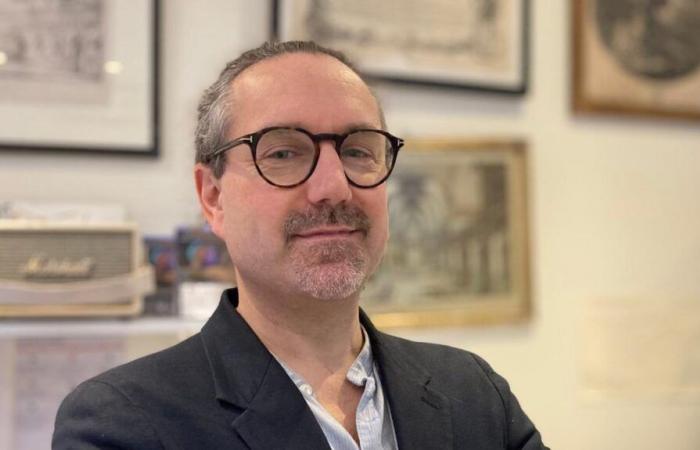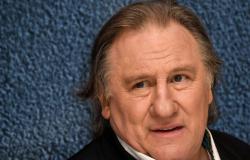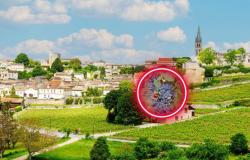Among French classical artists, Julien Chauvin is one of those who have had a lasting impact on the baroque scene in recent years – but not only that – distinguishing himself both as a solo violinist and as a conductor. The Concert de la Loge, his ensemble created in 2015 in reference to a prestigious 18th century orchestra, has become one of the must-sees. Today it is celebrating its tenth anniversary with a gala at the Théâtre des Champs-Élysées on Wednesday January 15.
To talk about it, we met Julien Chauvin in the ensemble’s offices, located in Paris, in an emblematic district in the history of Music, rue Rameau, in the 1st arrondissement.
Franceinfo Culture: Why celebrate ten years of a classic ensemble?
Julien Chauvin: When you create an ensemble, it is inevitably destined to grow, to experience things. In ten years, we may have reached a certain stage of maturity.
The place where we find ourselves, in the heart of musical Paris at the end of the 18th century, is already a nod to your historical approach…
In terms of heritage, the situation is exceptional, it is in this district that there were all the music publishers, the luthiers, it is here that the composers also lived. Above all, we are a stone’s throw from the Louvois theater, where there was the opera, and where the Concert de la Loge gave concerts at the very end of the 18th century. And then we are opposite the National Library of France, where all the secrets, all the treasures of French history are obviously nestled.
You created your ensemble to revive what was formerly called the Olympic Loge Concert, born in 1783. Can we speak of a sort of journey through time that you began ten years ago?
Yes, it’s a journey through time, and for me a kind of treasure hunt. It’s true, I’m totally fascinated by this period, between 1770 and the French Revolution, which saw the emergence of so many new musical genres. There were so many exchanges with composers who came from Italy, Germany, Belgium, and Paris must have been a place of absolute excitement promoting creativity, emulation and the esteem of others.
The esteem of others?
Yes, since the subtitle of the Concert de la Loge orchestra is the “Olympic of Perfect Esteem”. It was the place in which we had the most esteem and recognition for others: it is the end of this century of Enlightenment. Bringing it back to life in a contemporary way, for me, that really had meaning. It was a mission: we don’t come with slippers, all full of cobwebs. We take inspiration from this era, we immerse ourselves in it, but we transmit it in a new, original and contemporary way.
Ten years later, is this spirit intact?
The spirit is completely intact, we are in very regular contact with musicologists, historians and we still find things. We even draw inspiration from things that sometimes seem insignificant – an instrument, an object, a medal, a score – to create our contemporary project for 2025.
We talked about time travel. How do you position yourself in relation to the so-called “historically informed” approach? [fidélité aux textes, interprétation sur instruments d’époque, etc.] who was dominant among the musicians of the Baroque revival?
We have a duty to adapt and draw inspiration from what is happening at the moment, from what the public likes, while maintaining our standards, our musical integrity, that is really the most important thing.
So let’s talk about this “bold programming” which is claimed by all. What does that mean to you?
This means for example, during this year when we celebrate our tenth anniversary, that we can propose a project of Four seasons by Vivaldi with breakdancers. But also make the first recording on period instruments ofIphigenia in Aulide by Gluck, which is an ultra-famous opera and important for the history of music, in its integrity. But also organize our traveling festival Dare Haydn!, because we think that this musician is essential in the life of a musician and must be in that of the public. And finally, start our tenth anniversary year with a new repertoire that will take us to the frontier of the 19th century: it will be an opera by Rossini that we will perform at the Théâtre des Champs-Élysées.
Let’s return to the collaboration with the choreographer Mourad Merzouki for the show The Four Seasons with hip-hop dancers. What emerges from this dialogue? Can we talk about a kind of “enriched” musical experience?
Yes, that’s it, that’s the idea of this project: to have an “enhanced” feeling for both the public and the artists. We managed to reach and bring together in the same room audiences who did not come for the same purpose: people who came to listen to baroque music, others to see hip-hop dancers. On the artist side, the originality of the project is to manage to mix the two, to make us inspire each other, and to question our practice too: the dancers, it calls into question their practices of dance, and us, our body language and our musical freedom.
For the show, did Vivaldi’s music have to be somewhat distorted?
I wanted to have the greatest possible integrity in relation to the work. The people who came for the music were served because it was offered acoustically, by a large orchestra. There are 2 or 3 transitions that are made during the show, but we recognize the Four seasons. We know what movements are involved and we haven’t distorted the music to fit the dance. Everyone remains in their area of predilection, integrity and demands, but we still manage to merge. Obviously, we have taken steps towards each other, but the work is given.
Beyond this experience, what do you think is the way to reach as many people as possible with classical music? This was already the ambition of the Olympic Lodge Concert, at the end of the 18th century…
You have to be in a situation of listening to the public. This means finding the works you want to perform and the words to explain them. This means thinking not about how to interpret music, but how to transmit it. So it also has an impact on the interpretation, surely, but the most important thing is in what form we want to serve it. Music, of course, can be heard, but it can also be seen. And so you can see where the music is going.
That’s to say ?
It interests me to see how composers constructed their music. The public wants to see, for example, how Mozart, in his composition, ensures that a phrase begins on the oboe, then it passes to the bassoon, and it ends on the flute, and all on a carpet of strings. I want to show all of this, to image it. This is a bit of what we achieved with this production of Don Giovanni at the Athénée where we had the orchestra on stage and the public could follow the music and its words with the singers.
Let’s talk about the tenth anniversary gala on January 15: there will be famous opera artists with whom you have collaborated, from Sandrine Piau to Philippe Jaroussky, including Karina Gauvin, Marina Viotti and Stanislas de Barbeyrac. But beyond the stars, what does his program reveal about your ensemble and your musical approach?
Very clearly, this gala tells a large part of “our” history, that is to say many works which are linked to our orchestra in the 18th century. We are going to do a recreation of a very short oratorio by Antonio Salieri [compositeur contemporain de Mozart]which was written for the Olympic Lodge. Also recreation of a work by François-André Danican Philidor [compositeur français, 1726-1795] for heart and soloist. This concert is really: look at what we did as an opera, as a lyrical tragedy, by Antonio Sacchini [1730-1788]de Christoph Willibald Gluck [1714-1787]or what we did in the instrumental field with concertos. So there will be a lot of things: some hits of course, but also discoveries. It seems important to me for a gala that people can be surprised: oh yes, there is a Opening of Démophon de Johann Christoph Vogel [1756-1788]which was an absolute hit at the time, which was created by the Olympic Lodge. And we’re going to perform this piece for the first time, it’s never been performed again! This seems to me to be a very important approach.
The Concert de la Loge, tenth anniversary gala, January 15, 2025, at the Théâtre des Champs-Élysées, 15 avenue Montaigne, 75008 Paris






